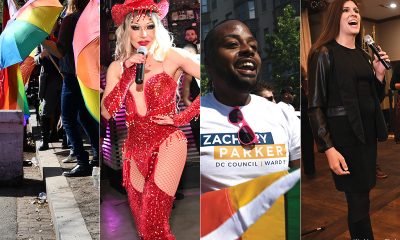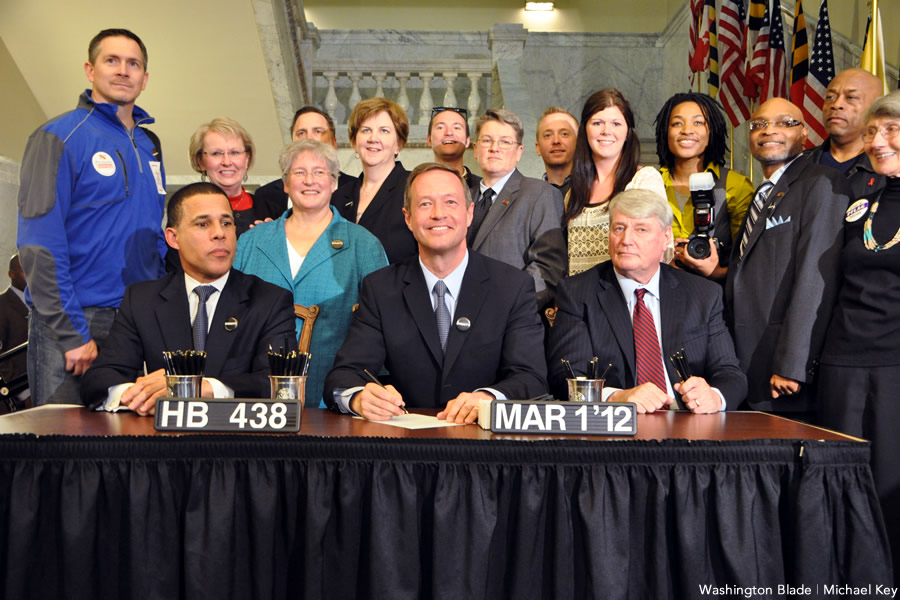Living
The Maryland originals
Couples from the 2004 lawsuit rejoice at state’s marriage passing


Dave Kolesar, left, and his partner, Patrick Wojahn, in Annapolis for last week's Maryland marriage bill signing. (Blade photo by Michael Key)
There’s no questioning Charles Blackburn’s love for partner Glen Dehn: He met the now-retired government worker at a party, moved in immediately and is still with him 33 years later.
Yet the pair has never walked down the aisle — not because the men didn’t want to, but because the state of Maryland said they couldn’t.
“We could never understand how a committed relationship of two gays or two lesbians could possibly hurt a heterosexual marriage and we haven’t been told yet,” says Blackburn, who, urged by a friend, signed the couple up to join a 2004 lawsuit for same-sex marriage in Maryland.
Years later, the Blackburn-Dehn couple is among 19 original plaintiffs rejoicing in the wake of a newly signed measure legalizing gay marriages in Maryland. Gov. Martin O’Malley signed the bill into law on March 1; Maryland joins D.C. and six states in legalizing gay marriages. The Civil Marriage Protection Act is scheduled to take effect in January, though a voter referendum in November could kill the measure before then.
For now, the signing brings to a close a fight that’s meandered from the failed lawsuit, to legislative hearings and finally, to the governor’s desk.
As the fight for marriage has twisted and turned, so too have the lives of those original couples — through family changes, relationship endings and new beginnings.
Yet through it all, several of the original plaintiffs tell The Blade they’re glad to have played a role in securing the rights of same-sex couples and families in Maryland and beyond.
“Whatever obstacles you face, you want to make it better for yourself but you also want to leave a path that’s a little bit better for the people who come behind you,” says Gita Deane, who joined the suit with partner Lisa Polyak. “I don’t for a minute think that we shouldn’t have done it.”
‘We had to do it’
Polyak and Deane were living the life of the average family with two young daughters when a turn at the microphone during a town hall near their Baltimore home changed everything.
“(We) just spoke about the difficulties of our lives being parents and about things we wanted to do for our kids that we couldn’t,” says Polyak, who later got a call from the American Civil Liberties Union.
The civil liberties group was looking for couples to join a lawsuit to be filed in Baltimore with the cooperation of Equality Maryland. The groups would charge that a state law denying same-sex couples the right to marry violated the Maryland Constitution.
Joining the case could mean helping pave the way for their family and similar families to enjoy the financial and emotional benefits of legal marriage. But it could also mean harassment.
“I had a great many worries about how this would impact my children,” Deane says. “When we had time to talk to the lawyer ACLU my first question was, ‘Is anybody going to send us hate mail or put up signs on our front yard?'”
Farther south in Riverdale, Md., Mikkole Mozelle was also apprehensive when her then partner Lisa Kebreau mentioned getting involved in the case she’d heard about through an email — but for different reasons.
“I guess I always thought something like this was extraordinary people fighting extraordinary struggles and we were just your everyday, average couple. It caught me off guard, but in a good way,” says Mozelle, a black woman who eventually embraced the idea of changing the largely white face of the gay marriage push.
The planned lawsuit would be one in a string filed by the ACLU, its partners and affiliates on behalf of same-sex couples seeking marriage equality in New York, Oregon, California and the state of Washington.
ACLU attorneys would eventually file suit in state court in Baltimore in July 2004 on behalf of nine couples and a widowed man. Among them were Kebreau and Mozelle, Polyak and Deane.
“It would never have been my choice to be public about my life,” Deane says. “(But) we had to do it because we had children and we have a responsibility to our children to make sure we’re able to take care of them.”
A matter of families and finance
From the beginning, the plaintiffs have argued the marriage question had less to do with certificates and ceremonies and more to do with tax breaks, health insurance and the other practical benefits that rise in importance as families grow and couples mature.
Dave Kolesar was just 18 years old when an infection led to brain surgery and a dim prognosis. Now 34, he’s in great condition, but worries along with his partner Patrick Wojahn about after effects.
They joined the case a year after Wojahn had proposed to Kolesar.
“In case something else were to happen to him, we wanted to be assured that I would be able to take care of him,” Wojahn says.
For plaintiff John Lestitian, that “what if” scenario became a reality in 2003, when his partner of more than a decade died suddenly. A subsequent battle over the home they shared and his final resting place encouraged him to join the suit.
“I’d gone through a situation of a contested will and dealing with the aftermath of the death,” he says. “My personal experience made me all the more willing to step forward.”
Yet for other plaintiffs, the choice to make their private lives personal stemmed in part from financial concerns. For instance, Charles Blackburn is blocked from sharing his partner’s federal health benefits, which he estimates could save the couple several thousand dollars each year.
Polyak and Deane estimate they’ve spent tens of thousands of dollars yearly on separate health insurance policies and the adoptions of each other’s biological children.
Despite the money spent, the couples remain financially at risk.
“We’ve done as much as we can through wills and legal things,” Deane says. “But we can only cover about eight of the 1,000 benefits that come with marriage on our own.”
Reaching the victory lap
On March 1, Patrick Wojahn and Dave Kolesar joined dozens of same-sex couples, gay lawmakers and advocates who stood behind O’Malley as he signed the historic bill in Annapolis.
“It was just electrifying,” Wojahn says. “There was so much excitement in the air.”
The bill-signing ceremony came just one week after the Maryland Senate voted 25 to 22 to approve the measure, and nearly five years after the Maryland Court of Appeals voted 4 to 3 to uphold state law barring same-sex marriage, ending the ACLU’s suit.
The ACLU and Equality Maryland immediately took the push to the General Assembly, and the plaintiffs largely went back to their normal lives.
Wojahn and Kolesar married in D.C last year, as did Polyak and Deane, who said they tired of waiting on legislators.
Lestitian found a new love and also married in D.C. in 2010, while Mozelle and partner Kebreau split in early 2009.
Still, Mozelle says she believes her partner is as pleasantly surprised as she is that the legislation went through.
“I feared that it wouldn’t,” she says, “but I prayed that it would.”
Some of the couples, like Wojahn and Kolesar, plan to re-marry in Maryland to ensure all of their rights.
For Blackburn and Dehn, both in their 70s, the ceremony they hope to have if the law holds would be their first.
But marriage or not, after 33 years, they know where they stand.
“I moved in a month after we met,” Blackburn says. “We just knew we had found something special in each other and it remained that way.”

Dear Michael,
I keep getting rejected on the apps. I don’t want to put myself out there anymore.
I don’t understand gay men. I think they behave really badly.
Guys stop replying in the middle of a text conversation and then un-match me. Guys don’t show up when we make a plan to meet. After a date or even a hookup that it seems clear we both enjoyed, I never hear from the guy again.
I am a pretty good looking and successful guy. I’m not a model or a billionaire but I’m sincerely wanting to date and eventually share a life with someone.
Unfortunately, everyone I am meeting, even if they say they have similar aspirations for a partner, acts like they’re looking over my shoulder for something better, and drops me for I-don’t-know-what reason.
I don’t have a lot of trust in the sincerity of gay men.
I know I sound bitter but I’ve been at this for a while and it keeps happening.
I know there’s a saying that if it keeps happening to you, you must be the problem. Logically that makes sense.
Except, I think this keeps happening so often and so predictably that it’s not me. These people hardly know me. It’s more along the lines of, if everything about me isn’t exactly what they want, or some little thing that I say, think, or do offends them, they vanish.
I’m lonely, but what’s out there is awful. Maybe it’s best to not keep trying.
If you have a different way of seeing it that’s honest, not just some fluff to make me feel better and be hopeful, please enlighten me.
Michael replies:
I agree with you, there is a lot of this kind of behavior out there. I hear stories similar to yours all the time. Though people do find great relationships online, relying on apps to meet a partner can be tricky.
Hookup apps have little to do with any kind of real connection. Often, they don’t even have much to do with sex. For a lot of people, they’re more about trying to fill up some kind of emptiness and seeking validation. They also, obviously, objectify men, which is the opposite experience of what you’re seeking.
And dating apps lend themselves to a sort of takeout menu concept of dating. You get to specify exactly what you’re looking for—a little of this, a lot of that, please omit something else—and then believe you should get what you ordered. As if that really exists. And when something isn’t just what you wanted, forget it.
But life doesn’t work that way. Nor do people: You can enter the exact criteria for the man of your dreams, but he will surprise you or let you down at times in some major ways. That’s how it goes. Part of being in a relationship is accepting that we all have to deal with imperfection.
All that said, hordes of people are going to keep using all sorts of apps and keep looking for “perfect” partners and keep ditching perfectly fine guys for the most minuscule of reasons.
But that doesn’t mean that you have to stay on the apps if it’s demoralizing you and leaving you hopeless.
Before you sign off, perhaps you would like to have some fun and be creative. Just for example, you could write in your profile that you’re interested in meeting a guy who isn’t looking for perfection and is looking for a decent soul rather than a set of stats. You still might encounter a lot of guys who ghost you for no apparent reason, but you also might have some luck finding a sincere someone with relationship goals that are similar to yours.
Another, complimentary strategy: Toughen up your attitude to stop letting let these rejections get under your skin. They have little to do with who you are (unless you are oblivious to some major issue about yourself), so you needn’t take them personally. In other words, expect this to keep happening; and when it does, laugh and keep moving forward.
I understand you are feeling like giving up on gay men in general. Keep in mind that while there are a lot of reasons why many gay men focus more on sex and less on commitment, that isn’t true across the board. In my work over the years, I have met many gay men who are looking for what you’re seeking. You could strive to be hopeful that if you keep looking, you are likely to cross paths with some of them.
And where you look may play a role.
Whether or not you stay on the apps, I suggest you seek additional ways to meet a potential boyfriend. Before apps existed, people did find other ways to meet romantic partners, and these ways do still exist. I know that this path is not an easy one. The whole dating endeavor isn’t easy. But difficult is not impossible.
There are social and activity groups for gay men that are organized around some sort of shared interest. They aren’t overtly sexual, so often attract people who are interested in and looking for a deeper connection. Even if you don’t meet a boyfriend there, you might make some like-minded friends, and one thing may lead to another in all sorts of ways.
There’s also plenty you can do as a human being (not simply as a gay man) in the offline world that might interest and even uplift you, where you just might meet a man you like. Again, you might also simply make some friends, and through having a bigger social life, might ultimately meet your guy.
Simply put: Don’t let yourself feel like or be a victim. Don’t keep putting yourself in miserable situations. And figure out what it means for you to do your best to make what you’d like to happen, happen.
Michael Radkowsky, Psy.D. is a licensed psychologist who works with couples and individuals in D.C., Maryland, Virginia, and New York. He can be found at michaelradkowsky.com. All identifying information has been changed for reasons of confidentiality. Have a question? Send it to [email protected].
Real Estate
New year, new housing landscape for D.C. landlords
Several developments expected to influence how rental housing operates

As 2026 begins, Washington, D.C.’s rental housing landscape continues to evolve in ways that matter to small landlords, tenants, and the communities they serve. At the center of many of these conversations is the Small Multifamily & Rental Owners Association (SMOA), a D.C.–based organization that advocates for small property owners and the preservation of the city’s naturally occurring affordable housing.
At their December “DC Housing Policy Summit,” city officials, housing researchers, lenders, attorneys, and housing providers gathered to discuss the policies and proposals shaping the future of rental housing in the District. The topics ranged from recent legislative changes to emerging ballot initiatives and understanding how today’s policy decisions will affect housing stability tomorrow.
Why Housing Policy Matters in 2026
If you are a landlord or a tenant, several developments now underway in D.C., are expected to influence how rental housing operates in the years ahead.
One of the most significant developments is the Rebalancing Expectations for Neighbors, Tenants and Landlords (RENTAL) Act of 2025, a sweeping piece of legislation passed last fall and effective December 31, 2025, which updates a range of housing laws. This broad housing reform law will modernize housing regulations and address long-standing court backlogs, and in a practical manner, assist landlords with shortened notice and filing requirements for lawsuits. The Act introduces changes to eviction procedures, adjusts pre-filing notice timelines, and modifies certain tenant protections under previous legislation, the Tenant Opportunity to Purchase Act.
At the same time, the District has expanded its Rent Registry, to have a better overview of licensed rental units in the city with updated technology that tracks rental units subject to and exempt from rent control and other related housing information. Designed to improve transparency and enforcement, Rent Registry makes it easier for all parties to verify rent control status and compliance.
Looking ahead to the 2026 election cycle, a proposed ballot initiative for a two-year rent freeze is generating significant conversation. If it qualifies for the ballot and is approved by voters, the measure would pause rent increases across the District for two years. While still in the proposal phase, it reflects the broader focus on tenant affordability that continues to shape housing policy debates.
What This Means for Rental Owners
Taken together, these changes underscore how closely policy and day-to-day operations are connected for small landlords. Staying informed about notice requirements, registration obligations, and evolving regulations isn’t just a legal necessity. It’s a key part of maintaining stable, compliant rental properties.
With discussions underway about rent stabilization, voucher policies, and potential rent freezes, long-term revenue projections will be influenced by regulatory shifts just as much as market conditions alone. Financial and strategic planning becomes even more important to protect your interests.
Preparing for the Changes
As the owner of a property management company here in the District, I’ve spent much of the past year thinking about how these changes translate from legislation into real-world operations.
The first priority has been updating our eviction and compliance workflows to align with the RENTAL Act of 2025. That means revising how delinquent rent cases are handled, adjusting notice procedures, and helping owners understand how revised timelines and court processes may affect the cost, timing, and strategy behind enforcement decisions.
Just as important, we’re shifting toward earlier, more proactive communication around compliance and regulatory risk. Rather than reacting after policies take effect, we’re working to flag potential exposure in advance, so owners can make informed decisions before small issues become costly problems.
A Bigger Picture for 2026
Housing policy in Washington, D.C., has always reflected the city’s values from protecting tenants to preserving affordability in rapidly changing neighborhoods. As those policies continue to evolve, the challenge will be finding the right balance between stability for renters and sustainability for the small property owners who provide much of the city’s housing.
The conversations happening now at policy summits, in Council chambers, and across neighborhood communities will shape how rental housing is regulated. For landlords, tenants, and legislators alike, 2026 represents an opportunity to engage thoughtfully, to ask hard questions, and to create a future where compliance, fairness, and long-term stability go hand-in-hand.
Real Estate
Unconventional homes becoming more popular
HGTV show shines spotlight on alternatives to cookie cutter

While stuck in the house surrounded by snow and ice, I developed a new guilty pleasure: watching “Ugliest House in America” on HGTV. For several hours a day, I looked at other people’s unfortunate houses. Some were victims of multiple additions, some took on the worst décor of the ‘70s, and one was even built in the shape of a boat.
In today’s world, the idea of what a house should look like has shifted dramatically. Gone are the days of cookie-cutter suburban homes with white picket fences. Instead, a new wave of architects, designers, and homeowners are pushing the boundaries of traditional housing to create unconventional and innovative spaces that challenge our perceptions of what a home can be.
One of the most popular forms of alternative housing is the tiny house. These pint-sized dwellings are typically fewer than 500 square feet and often are set on trailers to allow for mobility. Vans and buses can also be reconfigured as tiny homes for the vagabonds among us.
These small wonders offer an affordable and sustainable living option for those wishing to downsize and minimize their environmental footprint. With clever storage solutions, multipurpose furniture, and innovative design features, tiny homes have become a creative and functional housing solution for many, although my dogs draw the line at climbing Jacob’s Ladder-type steps.
Another unusual type of housing gaining popularity is the shipping container home. Made from repurposed shipping containers, these homes offer a cost-effective and environmentally friendly way to create modern and sleek living spaces. With their industrial aesthetic and modular design, shipping container homes are a versatile option for those contemplating building a unique and often multi-level home.
For those looking to connect with nature, treehouses are a whimsical and eccentric housing option. Nestled high up in the trees, these homes offer a sense of seclusion and tranquility that is hard to find in traditional housing. With their distinctive architecture and stunning views, treehouses can be a magical retreat for those seeking a closer connection to the natural world.
For a truly off-the-grid living experience, consider an Earthship home. These self-sustaining homes use recycled construction materials and rely on renewable energy sources like solar power and rainwater harvesting. With their passive solar design and natural ventilation systems, Earthship homes are a model of environmentally friendly living.
For those with a taste for the bizarre, consider a converted silo home. These cylindrical structures provide an atypical canvas for architects and designers to create modern and minimalist living spaces. With curved walls and soaring ceilings, silo homes offer a one-of-a-kind living experience that is sure to leave an impression.
Barn homes have gained popularity in recent years. These dwellings take the rustic charm of a traditional barn and transform it into a modern and stylish living space. With their open, flexible floor plans, lofty ceilings, and exposed wooden beams, barn homes offer a blend of traditional and contemporary design elements that create a warm and inviting atmosphere, while being tailored to the needs and preferences of the homeowner.
In addition to their unique character, barn homes also offer a sense of history and charm that is hard to find in traditional housing. Many of them have a rich and storied past, with some dating back decades or even centuries.
If you relish life on the high seas (or at a marina on the bay), consider a floating home. These aquatic abodes differ from houseboats in that they remain on the dock rather than traverse the waterways. While most popular on the West Coast (remember “Sleepless in Seattle”?), you sometimes see them in Florida, with a few rentals available in Baltimore’s Inner Harbor and infrequent sales at our own D.C. Wharf. Along with the sense of community found in marinas, floating homes offer a peaceful retreat from the hustle and bustle of city life.
From tiny homes on wheels to treehouses in the sky or homes that float, these distinctive dwellings offer a fresh perspective on how we live and modify traditional thoughts on what a house should be. Sadly, most of these homes rely on appropriate zoning for building and placement, which can limit their use in urban or suburban areas.
Nonetheless, whether you’re looking for a sustainable and eco-friendly living option or a whimsical retreat, there is sure to be an unconventional housing option that speaks to your sense of adventure and creativity. So, why settle for a run-of-the-mill ranch or a typical townhouse when you can live in a unique and intriguing space that reflects your personality and lifestyle?
Valerie M. Blake is a licensed Associate Broker in D.C., Maryland, and Virginia with RLAH @properties. Call or text her at 202-246-8602, email her at [email protected] or follow her on Facebook at TheRealst8ofAffairs.
-

 Virginia2 days ago
Virginia2 days agoMcPike wins special election for Va. House of Delegates
-

 New York4 days ago
New York4 days agoPride flag removed from Stonewall Monument as Trump targets LGBTQ landmarks
-

 Florida4 days ago
Florida4 days agoDisney’s Gay Days ‘has not been canceled’ despite political challenges
-

 Philippines4 days ago
Philippines4 days agoPhilippines Supreme Court rules same-sex couples can co-own property



















